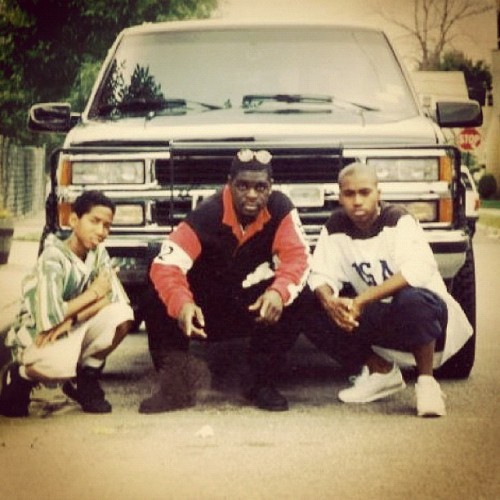T'Kuvma Da Unforgettable
My Wallabies attract bowlegged b1tches
SaLaAM ReMi ‏@SaLaAMReMi
Photo: .@NaS , Black Just , and The Black Truck #QueensStory (Taken with Instagram)

Man, Salaam is a good follow on Twitter.
who is the little nig ?
SaLaAM ReMi ‏@SaLaAMReMi
Photo: .@NaS , Black Just , and The Black Truck #QueensStory (Taken with Instagram)

Man, Salaam is a good follow on Twitter.

who is the little nig ?

Nas has been disappointing people nearly half his life. By now, the passion play of raised and swiftly dashed hopes that occurs whenever he announces a new album has repeated itself enough times to officially qualify as farce. You'd think he'd be exhausted by now, and there were times over his last three sleepwalking efforts when he sounded just that: a guy wearily familiar with his own towering mythology, and increasingly disinterested in living up to it.
But what if Nas stopped fretting about blowing people's minds or disappointing them and just, you know, made a record? It's the kind of question Nas devotees have spent years pondering, and Life Is Good, his 11th studio album and strongest in three or four presidential administrations, is basically the answer. Song for song, it's his most solid, disaster-free album since, well... we won't go there, as comparing Nas albums is like comparing birthdays where your father showed up late instead of not at all. But for once, Nas sidesteps oblivion. Life Is Good finds him avoiding most of his worst impulses, scraping the pseudo-mystical Righteous Teacher patina off his crown and touching back down in the Queensbridge of his sense memory over late-summer-light production.
Life Is Good is so consistent, in fact, that it's disorienting, and those of us with a long history navigating Nas albums will have a lot of pressing questions: What are all these top-shelf beats doing here? Where are the queasy sex jams, the songs rapped from the perspective of heroin spoons or discarded E&J bottles, the choruses about being a Warrior and a Hero? Where is the blindingly ill-fitting Nas Radio Bid? (The lone example, the Swizz Beatz-produced "Summer on Smash", is just inoffensively generic.) But above all: What happened this time?
Part of the answer is clear. The last few years have been turbulent ones in Nas' personal life -- his brutally public split with Kelis, the costly settlement, the embarrassing fiasco with his teenage daughter tweeting pictures of a bejeweled box of condoms in her bedroom. Historically at his best when shaken, Nas has rich material to work with here, and he's more open-hearted on Life Is Good than he has been since God's Son. "Daughters", his sweetly reflective response to the condom-gate that is no less sweet for its slight lyrical awkwardness (he refers to what is presumably Twitter just as "the social network"), finds him examining the responsibilities of fatherhood with fond bewilderment. The song aimed directly at Kelis ("Bye Baby"), meanwhile, is more a good-times remembrance than score-settling. "You screamin' at the racist cops in Miami was probably the highlight of my life," he recalls, the affection audible in his voice.
It's also entirely possible that Nas fans have No I.D. to thank for Life Is Good's quality. In the recent Complex cover story on Nas, I.D. said that he "wanted to make a soundtrack that allowed Nas to be Nas." Mentor to Kanye, a Chicago rap veteran, and the current executive vice president at Def Jam, No I.D. seems to be cementing his role as the Rap Whisperer: He recently guided a deeply confused Common to his first good record in nine years, and it's likely he exercised some of the same gentle-but-firm guidance here. He produces five of 14 tracks on Life is Good, and they all exude the warm TV-fireplace crackle of the best throwback production. You can feel the July city-heat sweat drip off the wooly saxophone on "Stay", while "Back When" flickers like a dim neon sign. The lyrics to "Back When" don't even do much besides gesture at Nas' musty mythology: "check out the oracle bred by city housing," Hollis Ave, Shan, and Marley, "you love to hear the story of how it all got started," etc. But he breathes through it with old-Shakespearean-actor fondness-- he was, after all, there, and No I.D. provides just the right lighting.
The rest of the production list reads as if it were crowd-sourced by exacting Nas purists: Buckwild, Salaam Remi, the late Heavy D (who gave Nas "The Don" before he passed away). Remi's blaring beat for "A Queens Story" is like a louder, more dramatic version of "Get Down", its tension ratcheted up by James Bond-theme horn blurts. There are a couple of playful, possibly shameless nods to Illmatic: On the intro to "Loco-Motive", a suspiciously familiar-sounding subway train rolls over tracks in the distance. Nas dedicates the song to "my trapped in the 90s nikkas," a line that could be used against him but that sounds, in the album's context, like playfulness. You can't recapture lightning in a bottle, or age backwards, but you can settle gracefully into strengths. Nas isn't back; he's just here.
TIME.COM calls #lifeisgood @Nas' best album since #Illmatic*
Nas Returns to Form with Life Is Good | Entertainment | TIME.com

its even better in the whip, I just can't stand that nikka miguel. His voice is so fukking annoying/gay/weird wish we could get a version of the song without himSummer on smash came on while i was driving and I didnt skip it.
 the clerk told me he had JUST put out the last 7 copies an hour ago. Its only 1:00pm here
the clerk told me he had JUST put out the last 7 copies an hour ago. Its only 1:00pm here